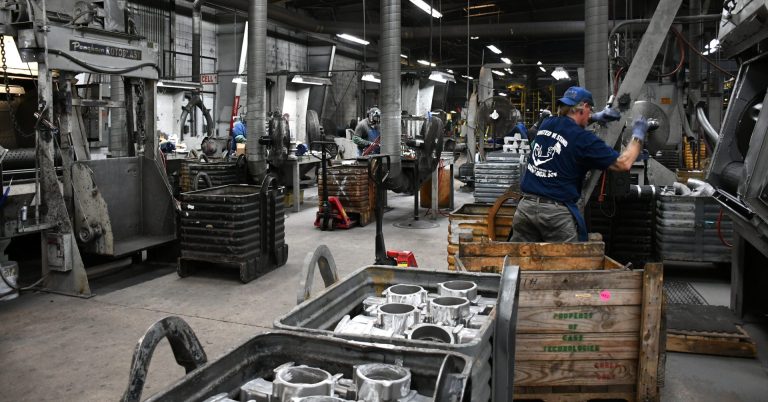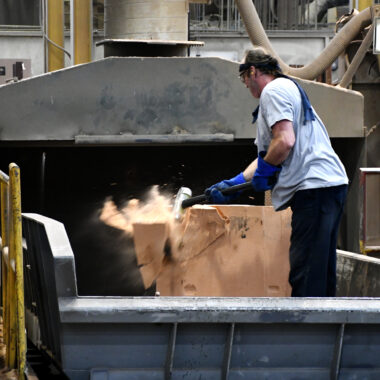Elevate Your Craft: Advanced Techniques for Casting Aluminum Illinois
Elevate Your Craft: Advanced Techniques for Casting Aluminum Illinois
Blog Article
Getting Quality in Aluminum Spreading: Important Advice
In the realm of light weight aluminum quality, accuracy and spreading are extremely important (casting aluminum illinois). The process of changing molten aluminum into complex and resilient components requires a thorough approach at every stage. From meticulously picking the appropriate products to refining pouring methods and making certain careful finishing touches, attaining excellence in aluminum casting requires a mix of competence and focus to information. As experts in the area make every effort to excellent their craft, mastering a collection of essential tips and tricks becomes essential. Let's explore the key elements that can elevate light weight aluminum spreading from great to phenomenal, establishing the phase for unequaled results and unrivaled craftsmanship.

Products Option
Choosing the proper products is extremely important in ensuring the success and quality of your aluminum casting projects. The choice of materials considerably affects the final properties of the casted items, consisting of toughness, durability, and overall quality. When picking products for light weight aluminum spreading, it is vital to think about aspects such as the kind of aluminum alloy, the desired mechanical homes, and the casting method being used.
Light weight aluminum alloys are frequently utilized in casting due to their light-weight nature and superb mechanical residential properties. The choice of the particular alloy depends on the application needs, with choices ranging from high-strength alloys suitable for architectural elements to corrosion-resistant alloys for marine settings. Comprehending the characteristics of various aluminum alloys is important for picking one of the most appropriate one for your task.
Additionally, the casting approach utilized, whether it be sand spreading, die spreading, or investment spreading, additionally influences product selection. Each spreading method has its very own requirements in regards to material fluidness, thermal conductivity, and mold compatibility. By meticulously considering these variables, you can make sure that the materials picked are customized to satisfy the details requirements of your aluminum casting job.
Mold And Mildew Preparation
In the realm of light weight aluminum casting, the thorough preparation of molds stands as an important forerunner to the real spreading procedure. It is essential to clean the mold thoroughly to remove any dirt, residue, or previous casting remnants that can endanger the new actors.
Following, using an appropriate mold and mildew layer is crucial to facilitate the launch of the actors light weight aluminum and enhance the surface finish of the component. The kind of layer utilized will depend on factors such as the intricacy of the mold and mildew, the wanted surface coating, and the spreading material. Additionally, proper airing vent and gating systems have to be integrated into the mold layout to permit the smooth flow of molten light weight aluminum and stop the formation of air pockets or defects in the actors component.
Melting and Pouring Strategies
To attain successful aluminum spreading, mastering efficient melting and putting methods is paramount for ensuring specific and top notch outcomes. The melting process is a critical action in aluminum spreading, where the metal is warmed to its liquid state. It is vital to keep an eye on the temperature very closely to avoid getting published here too hot, which can lead to inadequate casting high quality. Making use of induction heating systems or gas-fired crucible heaters can offer specific temperature control and reliable melting.
When the light weight aluminum gets to the desired molten state, correct putting techniques need to try this site be used to move the metal into the mold and mildews. The rate and uniformity of the put are essential consider achieving uniform filling of the mold tooth cavity and lowering the risk of problems like air entrapment or incomplete casting. Gravity putting, low-pressure spreading, or centrifugal spreading approaches can be utilized based on the specific requirements of the job.
Cooling and Solidification Control
Accomplishing exact control over the air conditioning and solidification procedure is crucial in aluminum casting to maintain the integrity and quality of the final casted products. Proper cooling and solidification control help prevent defects such as porosity, hot tears, and shrinkage that can compromise the mechanical residential properties of the casted light weight aluminum elements.
One vital element of cooling and solidification control is the design and placement of chills. Cools are metal items tactically placed in the mold to soak up warmth swiftly from certain locations of the casting, promoting uniform solidification and decreasing the possibility of problems. Additionally, controlling the air conditioning price by changing the mold's product, layout, and the application of protecting finishings can influence the microstructure and mechanical residential or commercial properties of the final casting.
Furthermore, monitoring and managing the cooling process via using thermocouples and computer simulations enable real-time modifications to optimize air conditioning rates and solidification patterns. By implementing these strategies, foundries can boost the high quality and consistency of their light weight aluminum castings, fulfilling the strict needs of different industries.
Finishing and High Quality Evaluation
Effectively performed ending up and high quality inspection procedures are essential in making certain the general honesty and reliability of light weight aluminum castings, building on the meticulous air conditioning and solidification control strategies employed throughout the spreading process. Ending up techniques such as grinding, sanding, and brightening help eliminate excess product, smooth rough surfaces, and boost the spreadings' final look. These procedures not just improve the aesthetic charm yet also make sure dimensional precision and functionality.

Verdict
To conclude, achieving quality in light weight aluminum casting calls for careful factor to consider of products selection, careful mold preparation, specific melting and pouring strategies, effective air conditioning and solidification control, along with extensive completing and quality evaluation procedures. By adhering to these vital pointers and tricks, producers can make certain the production of premium light weight aluminum spreadings that fulfill industry standards and client assumptions.
When picking products for aluminum casting, it is important to think about variables such as the kind of aluminum alloy, the desired mechanical residential properties, and the spreading approach being used.
Moreover, the casting method utilized, whether it be sand casting, die casting, or investment casting, also influences product selection.In the realm of aluminum casting, the precise preparation of molds stands as an important forerunner to the real spreading process. Gravity pouring, low-pressure casting, or centrifugal casting techniques can be utilized based on the particular demands of the project.

Report this page